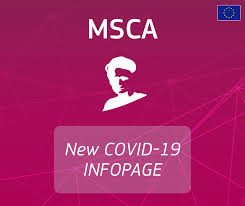Is there any possibility to extend the project duration of Horizon 2020 grants due to the COVID-19 situation? What happens if the mobility rule can no longer be fulfilled as a consequence of the COVID-19 related travel restrictions? Will the European Commission/Research Executive Agency (REA) be flexible if beneficiaries need to modify the researcher recruitment and working conditions due to the COVID-19 outbreak? The outbreak of the COVID-19 epidemic undoubtedly raised many doubts and detailed questions regarding the implementation of research projects financed by EU, especially regarding the Maria Skłodowska-Curie (MSCA) grants, which is a basic requirement of scientific mobility. In addition, the last two MSCA calls under H2020 have recently opened, another one has been extended. In the light of this, we would like to present the most important information below, relevant for both beneficiaries and those who are planning to participate in the program.
MSCA and COVID-19
In order to provide the institutions and individual MSCA project managers with easy access to current information, the European Commission has launched a new website dedicated exclusively to this program. The MSCA infopage on COVID-19 includes list of EU actions on coronavirus, information on Call extensions, and above all FAQ’s section.
It’s worth noting that the EC has published six new FAQs on the impact of the COVID-19 outbreak on MSCA. It clarifies that the researcher allowances for ITN and IF fellows must be paid, even in cases where work on the project cannot be carried out as planned at the moment. What is more, adjustments to the project that affect the fellows’ employment contract, e.g. the transition from full-time to part-time or the temporary suspension of the project are possible, but are only allowed with the agreement of the fellows and with an respective extension of the employment contract. The Commission also explicitly permits the use of the institutional lump sums for the increased staff costs. In addition to the reference to the general flexibility regarding deadlines for milestones, deliverables and reports that applies temporarily to all H2020 projects, the new FAQs also allow a more flexible approach for interpreting some MSCA-specific rules such as e.g. the mobility rule and the duration of RISE secondments.
In general, the EC recommends that all projects should be continued, as the provisions of the grant agreements concluded remain in force. If the planned activities can be performed remotely (e.g. reports, publications, training), they should be continued and the costs associated with them will be considered eligible.
MSCA – open calls
Due to the current situation and difficulties experienced by applicants, the EC decided to extend the deadline for submitting grant proposals in the MSCA RISE to 12th May 2020! Moreover, commitment letters from partners are to be required from applicants only at the stage of the preparation of the grant agreement and only in case of projects selected for funding or put on the reserve list.

On 8th April, the last MSCA COFUND and MSCA IF calls under H2020 were opened. In the case of MSCA IF, the deadline for submitting applications is 9th September 2020, whereas the MSCA COFUND grant proposals can be submitted until 29th September 2020.
All potential applicants are encouraged to familiarize themselves with the new version of the MSCA pocket guide, published by REA, which is addressed to individual scientists, universities, research institutes and companies. More information on MSCA programs (including basic documents can be found on the Net4MobilityPlus website.
We also recommend a series of online trainings dedicated to the MSCA IF and MSCA COFUND programs:
- Online training MSCA for individual scientists – last hand in Horizon 2020, organized by RPK Silesian University of Technology – 29th April 2020;
- Net4MobilityPlus Webinar MSCA COFUND – 7th May 2020;
- KPK webinar for organizations interested in inviting individual researchers under MSCA IF – 11th May 2020. It is addressed to those who provide support to scientists in writing applications, primarily to the applicants’ advisors, as well as to employees of international project support offices;
- Webinar Net4MobilityPlus MSCA IF – 2nd June 2020.
MSCA and Brexit
Last but not least there are many questions regarding the impact of Brexit on the implementation of ongoing projects as well as future research visits in UK under the MSCA IF program. That is why it should be emphasized that it is still possible to apply under MSCA IF H2020 for a research visit in one of the host institutions in Great Britain. Importantly, there is no difference in the status of UK in recent calls for proposals in MSCA H2020 because Great Britain participates in the EU budget until the end of the current financial perspective (IFF 2014-2020). There are also no specific guidelines for the latest MSCA IF or MSCA COFUND call because all existing rules still remain in force, even if the transitional period is not extended. As long as the call is funded from the current perspective, institutions in the UK can participate in projects and receive funding until the end of the project. More details are available here.
Furthermore, if the grant agreement is signed after the end of the transition period, this will not affect the status of British institutions, as the funds will continue to come from the current financial perspective. According to the information given earlier on the Funding & Tenders Portal, any changes and restrictions regarding the participation of British institutions in calls for proposals must be clearly presented in the ‘Topic conditions and documents’ section. The only restriction of this type is currently found in EIC Accelator call. If this information is not provided on the website in case of MSCA, then no additional restrictions can be applied.



